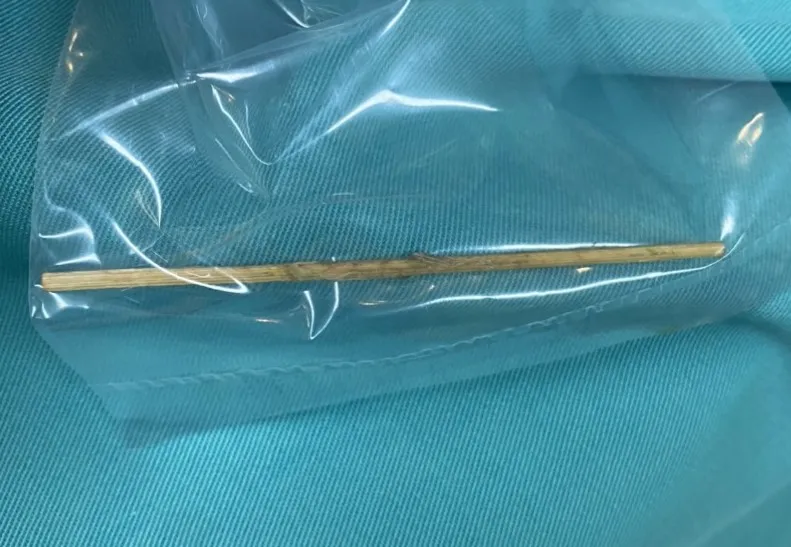According to the family, the patient began experiencing left-sided abdominal pain and fever in January 2025. When taken to the local hospital, the doctor discovered fluid accumulation around the spleen. The patient said he had been hit hard while swimming, and suspected of having an injury, so he was diagnosed with a spleen injury and treated conservatively.
However, 4 months later, the patient suddenly had a high fever again, accompanied by severe abdominal pain, and had to be rushed to the emergency room at a nearby hospital. Suspecting an infection, the patient was transferred to Children's Hospital 2 and admitted for treatment. After an ultrasound examination, doctors discovered a sharp foreign object about 7cm long in the patient's abdomen. Immediately, the patient was assigned emergency laparoscopic surgery. The result shocked the whole family when the foreign object removed was a toothpick.
According to the patient's family, the child had a habit of eating in a hurry and not chewing thoroughly, so he may have swallowed the toothpick without knowing it. The toothpick pierced the last part of the duodenum, causing prolonged inflammation and fluid accumulation in the splenic-renal cavity and the lower pole of the spleen, leading to abdominal pain and fever that recurred for many months. After surgery, the patient's health has stabilized and he is being monitored at the General Surgery Department - Children's Hospital 2.

Dr. Bui Hai Trung, Deputy Head of General Surgery Department, Children's Hospital 2, said that swallowing foreign objects is a very dangerous accident, especially common in children between the ages of 6 months and 3 years old. Although most cases do not cause serious consequences, there is still a small percentage (less than 1%) that can lead to serious complications such as obstruction, perforation of the digestive tract or infection.
In older children and adolescents, a dangerous foreign body that is often overlooked is the toothpick. This is a sharp, compact object, often used after meals and sometimes held in the mouth by children as a habit or unconscious behavior. At Children's Hospital 2, there have been a number of cases of children or adolescents accidentally swallowing toothpicks while talking, laughing or playing.
Due to its long, hard and sharp structure, toothpicks can penetrate the esophageal mucosa, causing inflammation, infection or perforation of the esophageal wall, mediastinum or adjacent organs such as the trachea, large blood vessels, even leading to mediastinal abscess, peritonitis or gastrointestinal bleeding. Foreign objects can also cause perforation of the stomach or intestines, with symptoms such as fever and abdominal pain in children.
“Wooden toothpicks are usually not radiopaque, so they are difficult to detect on X-rays, which can easily lead to late diagnosis or missed diagnosis. Initial symptoms may be vague or unclear, making it easy for family members and medical staff to overlook them. Therefore, family members should absolutely not let children suck on toothpicks, even after meals. Instruct children in the habit of cleaning their teeth with dental floss or a toothbrush instead of using toothpicks. If you suspect that your child has swallowed a toothpick, even if there are no obvious symptoms, you should take them to a medical facility with imaging capabilities (ultrasound, CT scan, etc.) as soon as possible,” Dr. Bui Hai Trung advised.
Source: https://www.sggp.org.vn/gap-cay-tam-nhon-dai-7cm-nam-trong-bung-benh-nhi-post796585.html

































































































Comment (0)